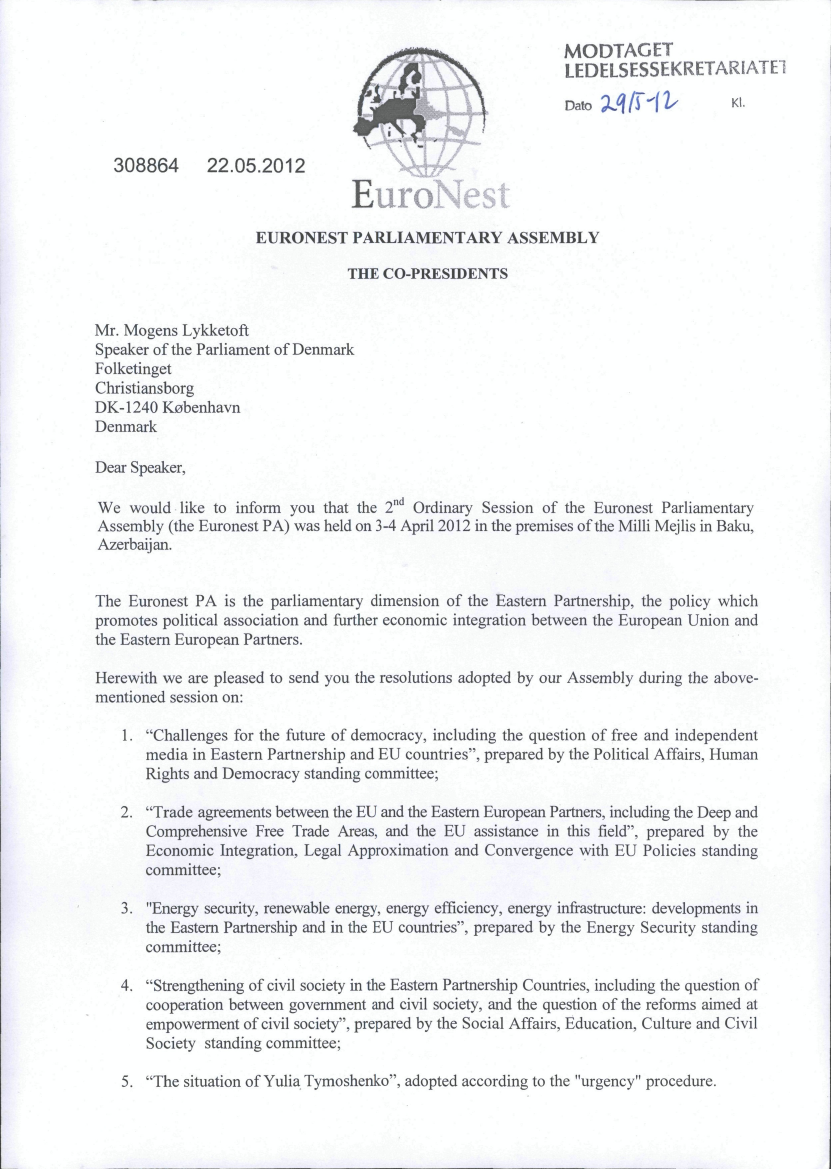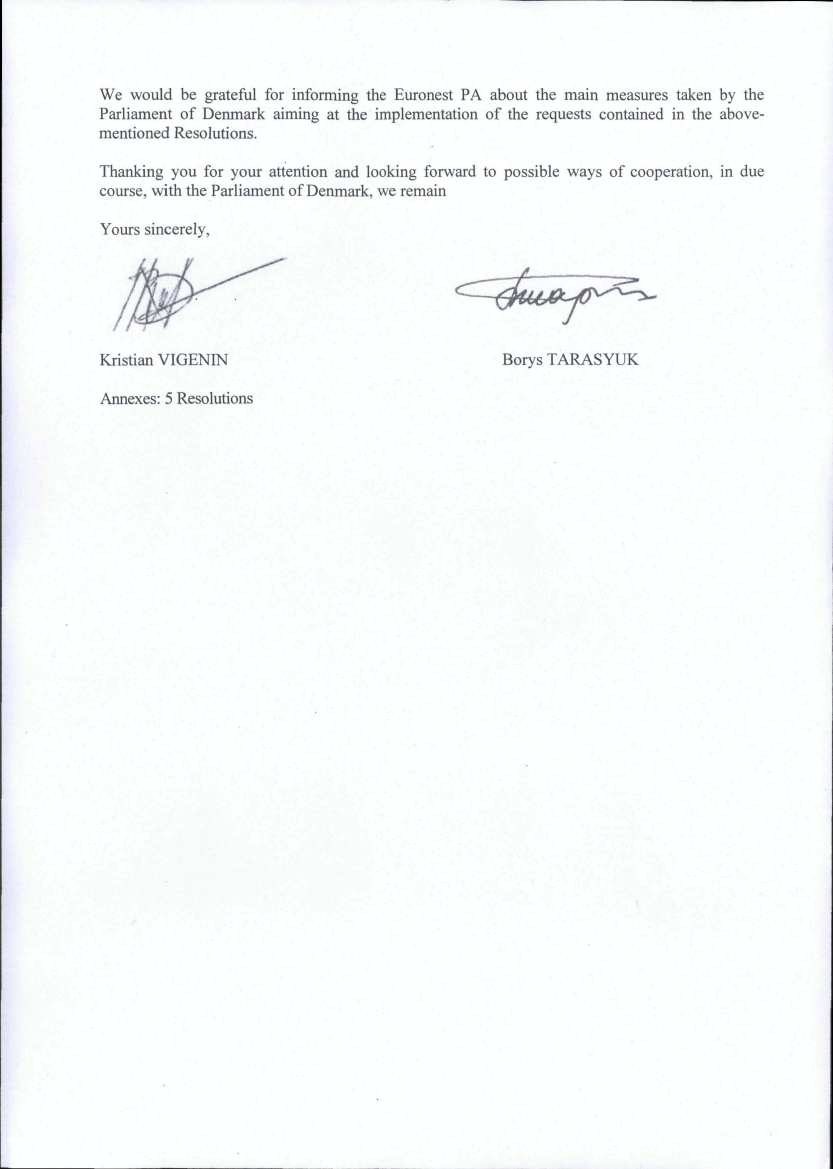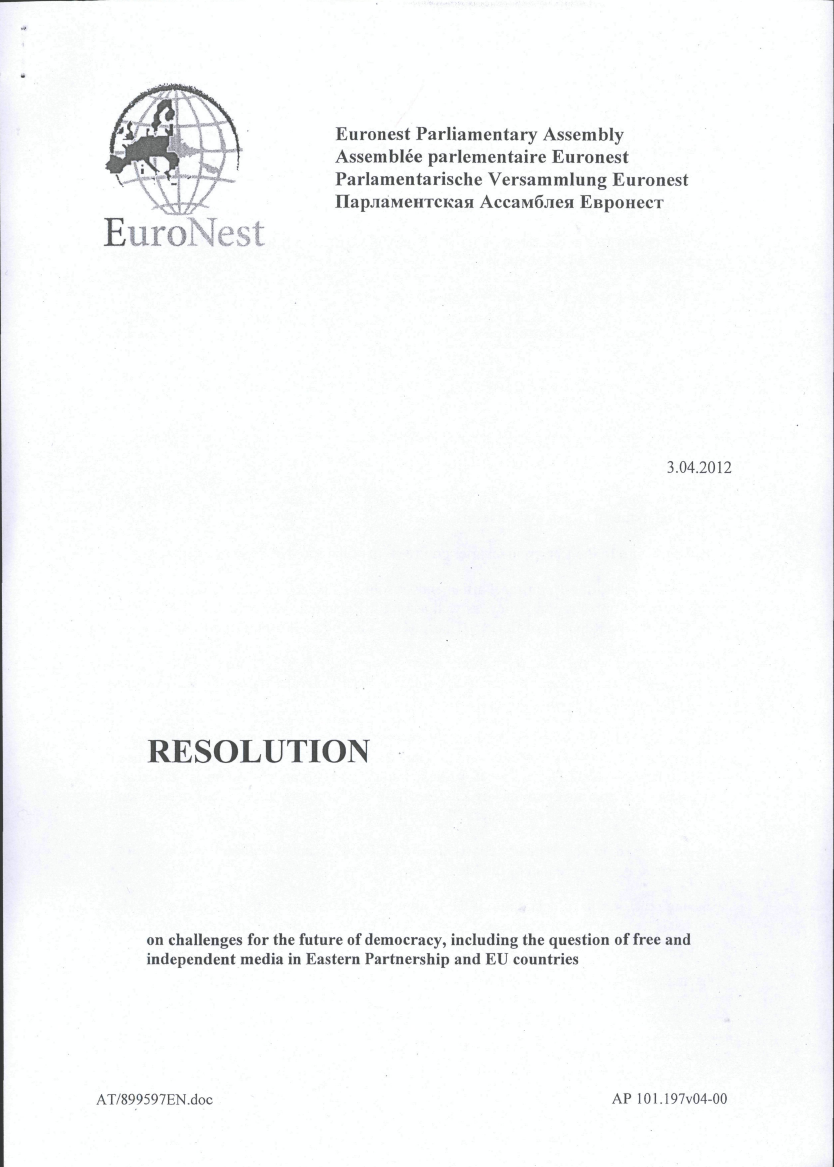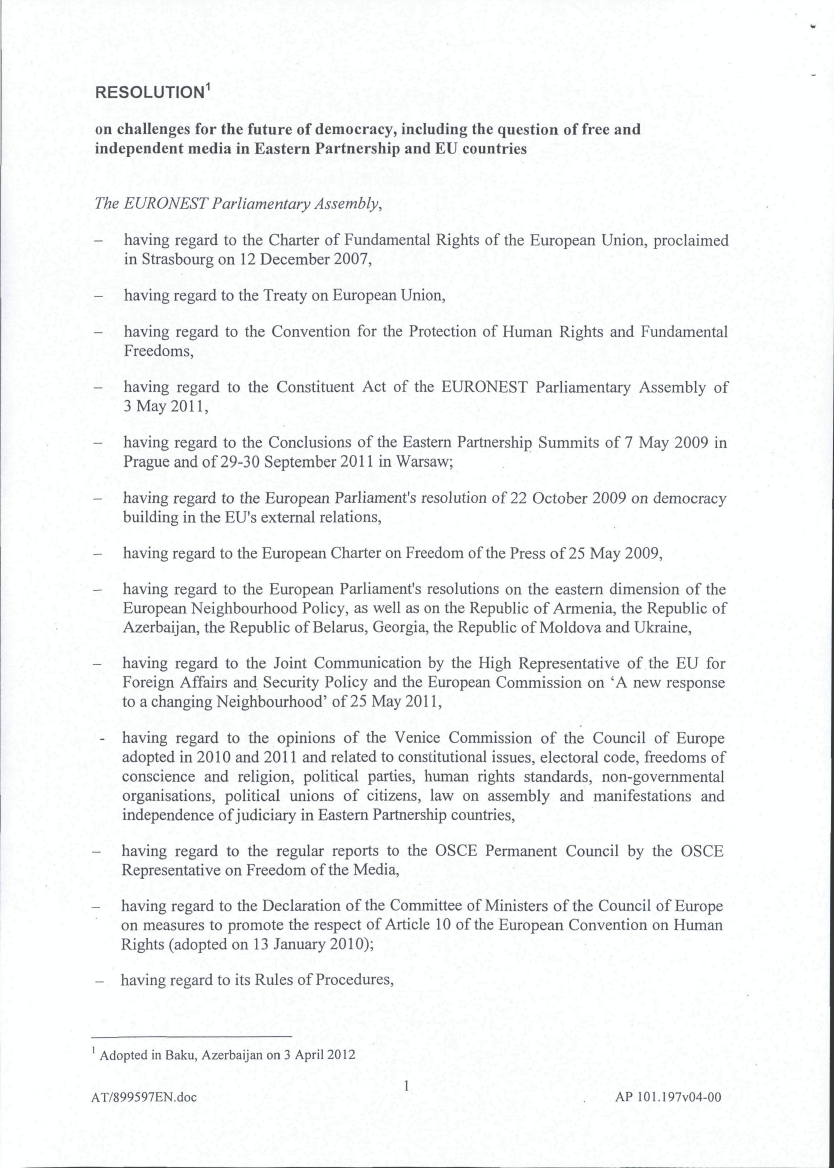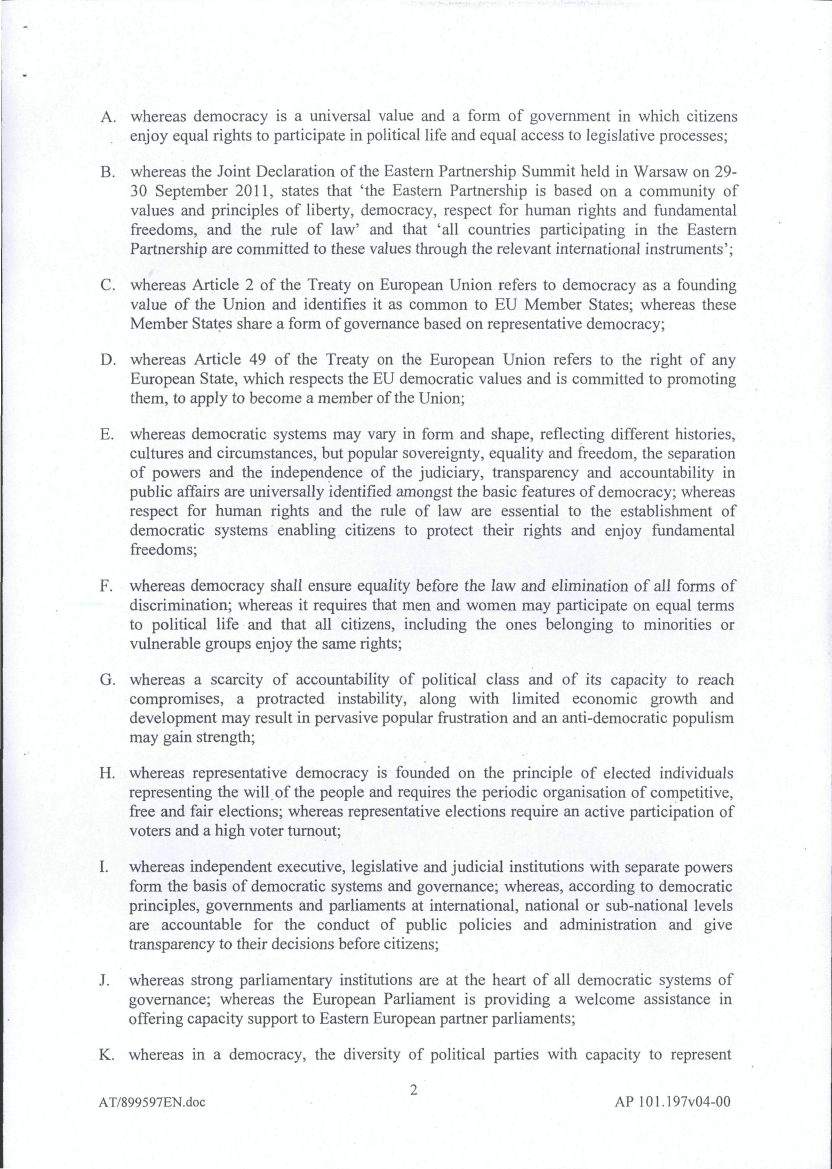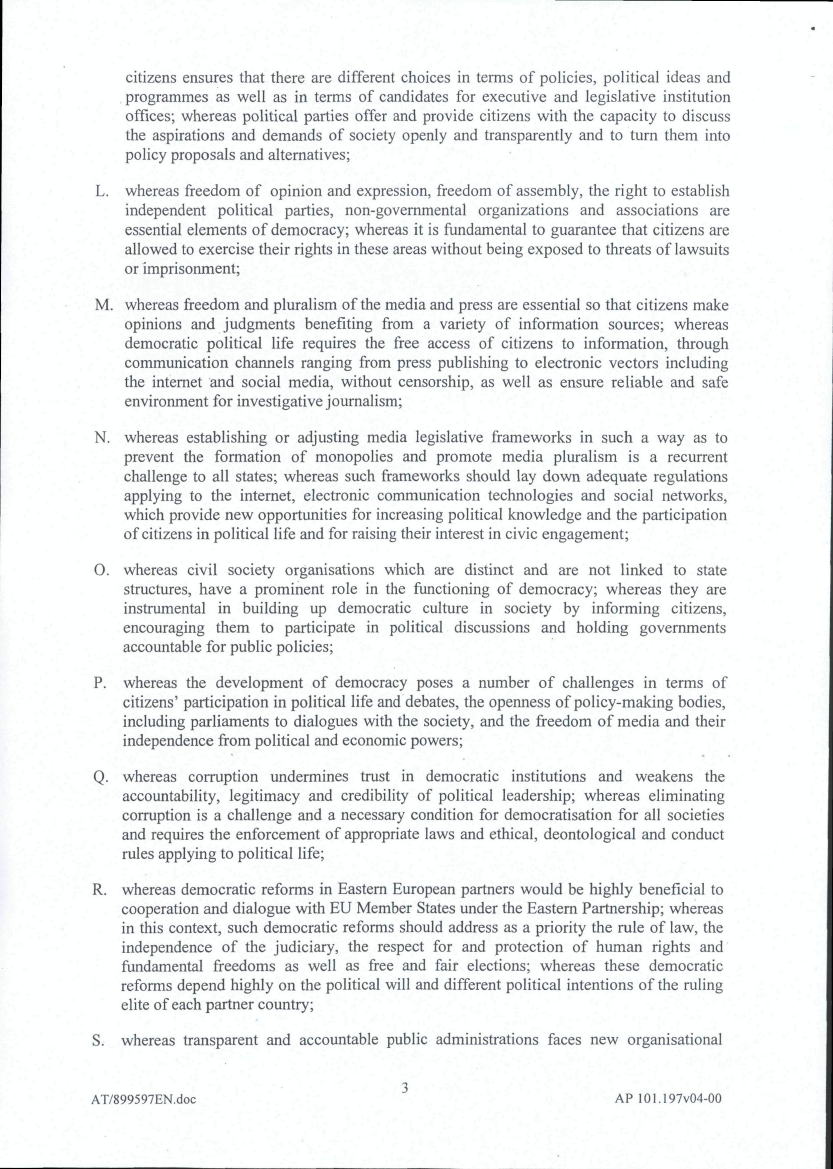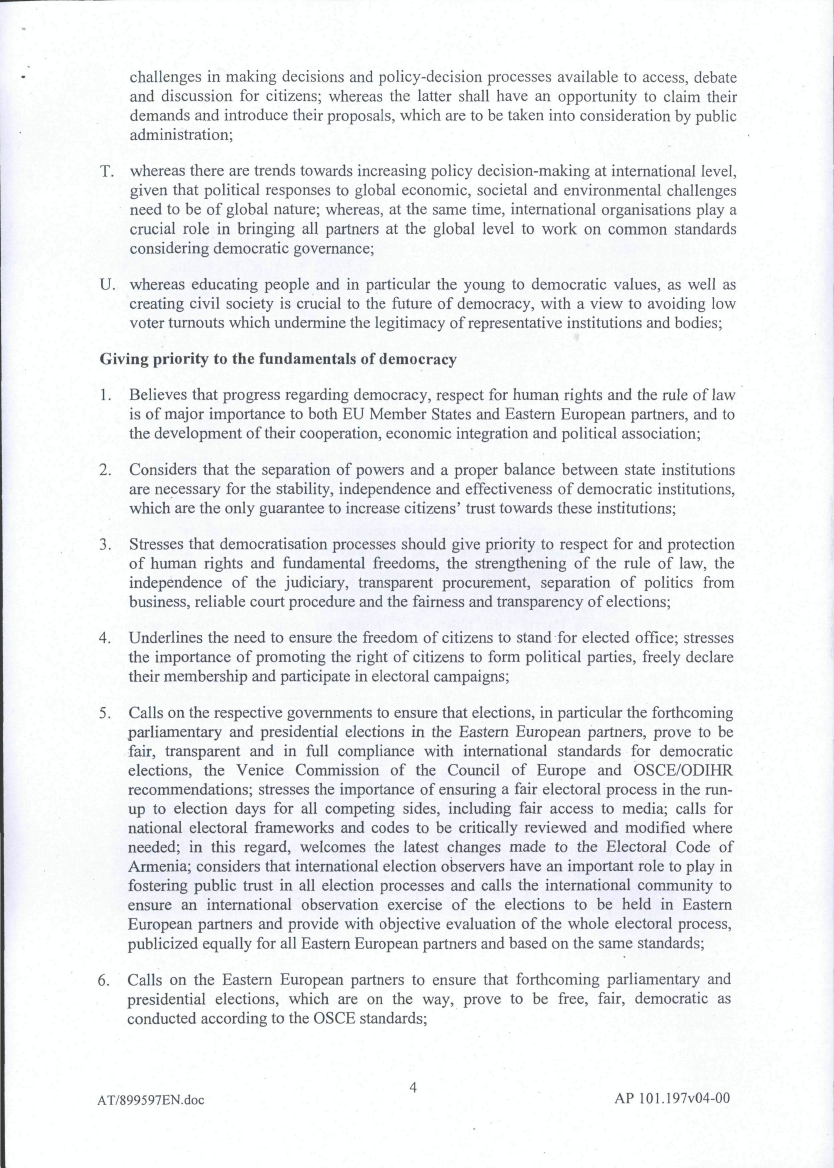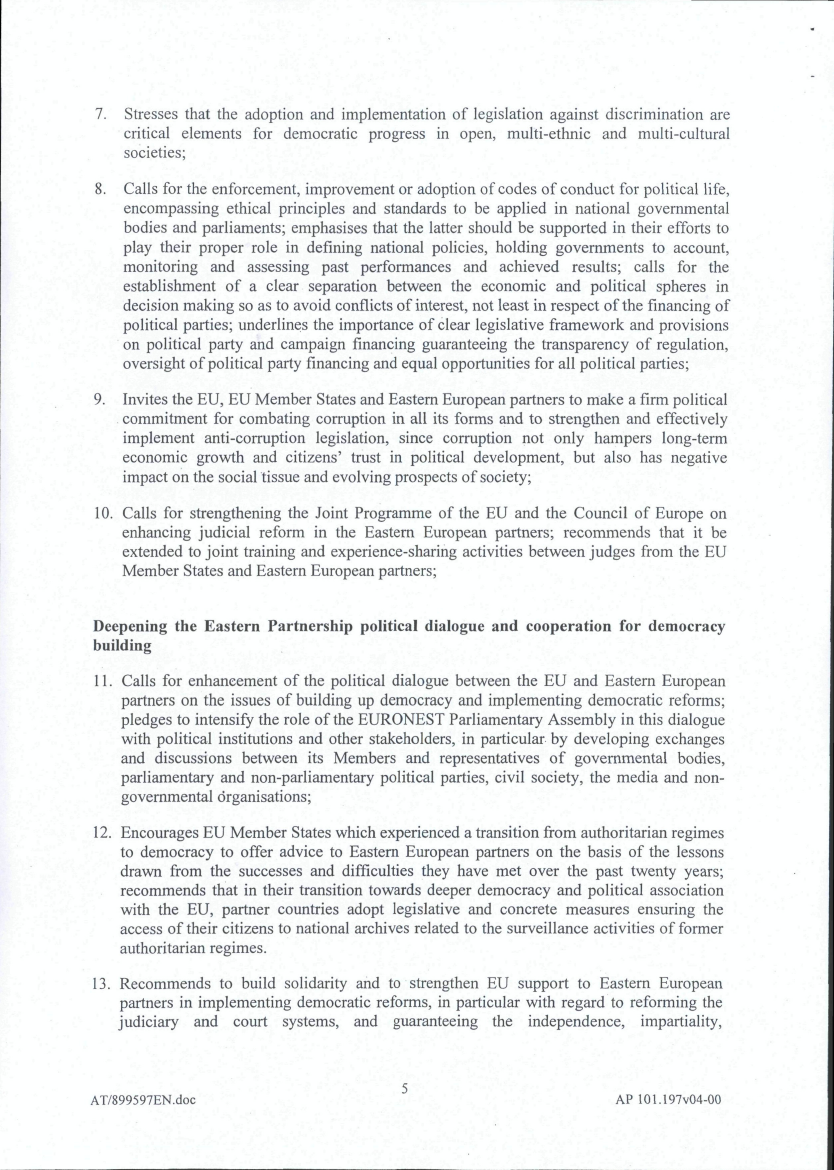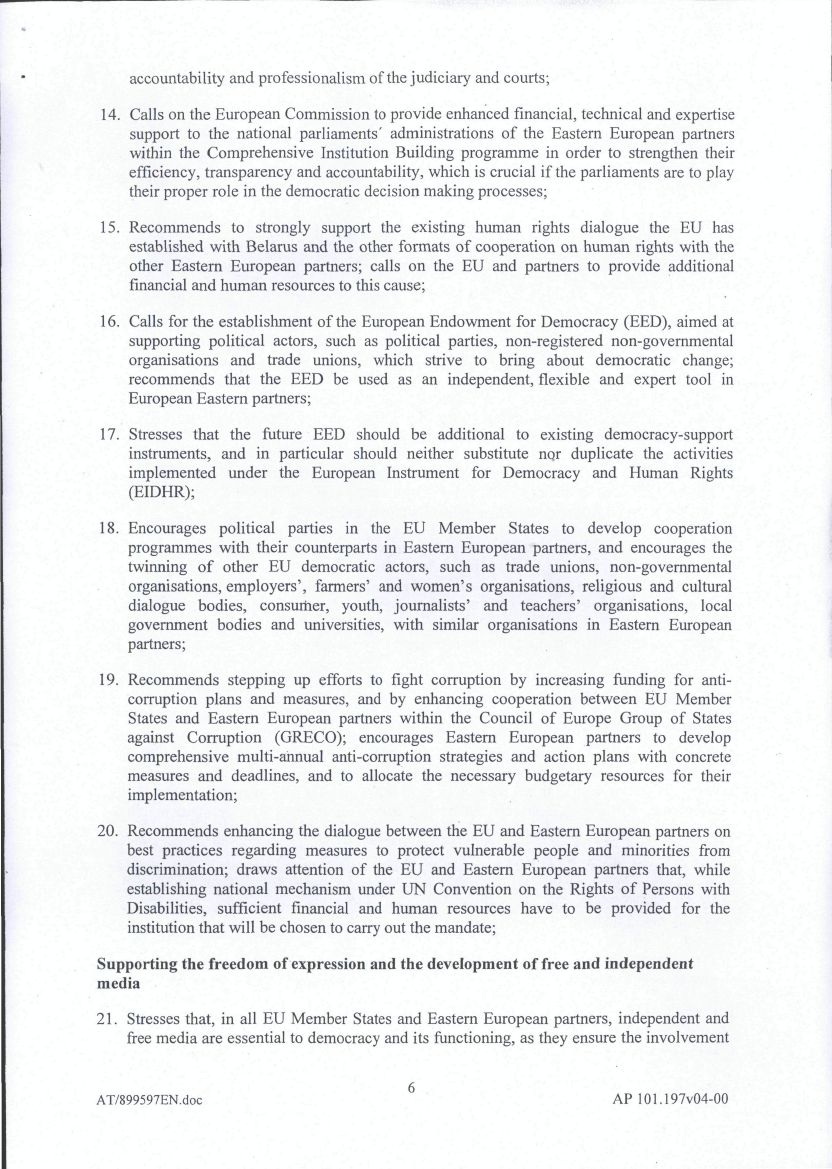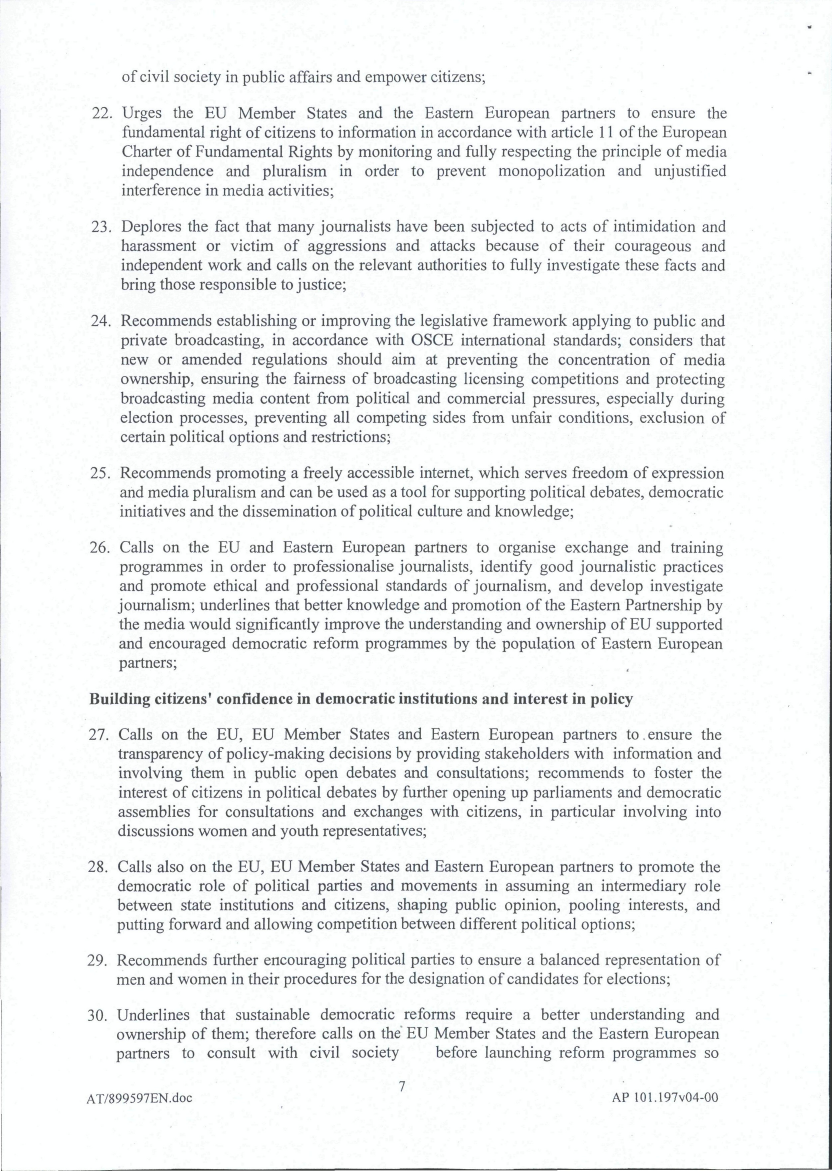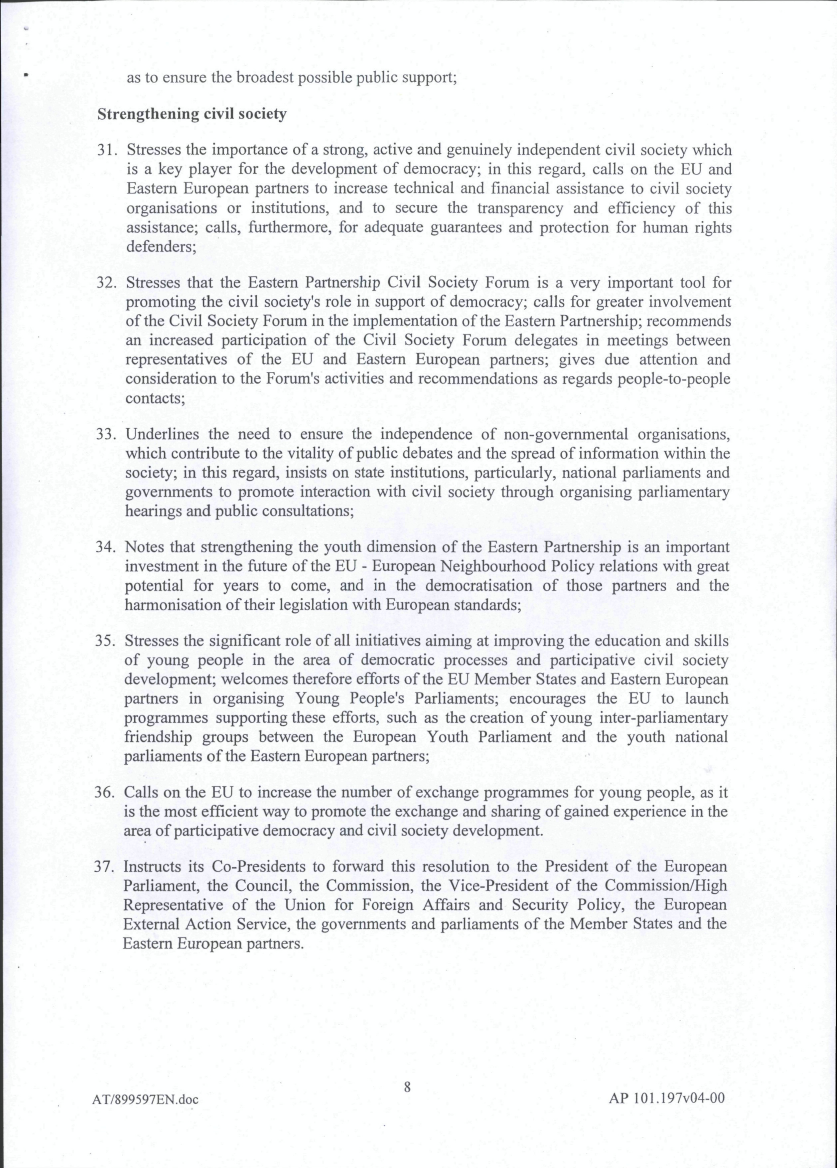Europaudvalget 2011-12
EUU Alm.del Bilag 470
Offentligt
MODTAGETLEDELSESSEKRETARIATET
DatoJ L f l / H l '30886422.05.2012
Kl.
EuroNeEURONEST PARLIAMENTARY ASSEMBLYTHE CO-PRESIDENTSMr. Mogens LykketoftSpeaker of the Parliament of DenmarkFolketingetChristiansborgDK-1240 KøbenhavnDenmarkDear Speaker,We would like to inform you that the 2ndOrdinary Session of the Euronest ParliamentaryAssembly (the Euronest PA) was held on 3-4 April 2012 in the premises of the Milli Mej lis in Baku,Azerbaijan.The Euronest PA is the parliamentary dimension of the Eastern Partnership, the policy whichpromotes politicai association and further economic integration between the European Union andthe Eastem European Partners.Herewith we are pleased to send you the resolutions adopted by our Assembly during the above-mentioned session on:1. "Challenges for the future of democracy, including the question of free and independentmedia in Eastern Partnership and EU countries", prepared by the Political Affairs, HumanRights and Democracy standing committee;2. "Tråde agreements between the EU and the Eastem European Partners, including the Deep andComprehensive Free Tråde Areas, and the EU assistance in this field", prepared by theEconomic Integration, Legal Approximation and Convergence with EU Policies standingcommittee;3. "Energy security, renewable energy, energy efficiency, energy infrastructure: developments inthe Eastem Partnership and in the EU countries", prepared by the Energy Security standingcommittee;4. "Strengthening of civil society in the Eastem Partnership Countries, including the question ofcooperation between govemment and civil society, and the question of the reforms aimed atempowerment of civil society", prepared by the Social Affairs, Education, Culture and CivilSociety standing committee;5. "The situation of Yulia Tymoshenko", adopted according to the "urgency" procedure.
We would be grateful for informing the Euronest PA about the main measures taken by theParliament of Denmark aiming at the implementation of the requests contained in the above-mentioned Resolutions.Thanking you for your attention and looking forward to possible ways of cooperation, in duecourse, with the Parliament of Denmark, we remainYours sincerely,
Kristian VIGENINAnnexes: 5 Resolutions
Borys TARASYUK
Euronest Parliamentary AssemblyAssemblée parlementaire EuronestParlamentarische Versammlung EuronestIlapjiaMeHTCKafl AccaM5jieH EeponecT
EuroNest
3.04.2012
RESOLUTION
on challenges for the future of democracy, including the question of free andindependent media in Eastern Partnership and EU countries
A17899597EN.doc
AP 101.197v04-00
RESOLUTION1on challenges for the future of democracy, including the question of free andindependent media in Eastern Partnership and EU countriesThe EURONEST Parliamentary Assembly,-having regard to the Charter of Fundamental Rights of the European Union, proclaimedin Strasbourg on 12 December 2007,having regard to the Treaty on European Union,-having regard to the Convention for the Protection of Human Rights and FundamentalFreedoms,having regard to the Constituent Aet of the EURONEST Parliamentary Assembly of3 May 2011,--having regard to the Conclusions of the Eastern Partnership Summits of 7 May 2009 inPrague and of 29-30 September 2011 in Warsaw;having regard to the European Parliament's resolution of 22 October 2009 on democracybuilding in the EUs external relations,having regard to the European Charter on Freedom of the Press of 25 May 2009,-having regard to the European Parliament's resolutions on the eastern dimension of theEuropean Neighbourhood Policy, as well as on the Republic of Armenia, the Republic ofAzerbaijan, the Republic of Belarus, Georgia, the Republic of Moldova and Ukraine,having regard to the Joint Communication by the High Representative of the EU forForeign Affairs and Security Policy and the European Commission on 'A new responseto a changing Neighbourhood' of 25 May 2011,-having regard to the opinions of the Venice Commission of the Council of Europeadopted in 2010 and 2011 and related to constitutional issues, electoral code, freedoms ofconscience and religion, political parties, human rights standards, non-governmentalorganisations, political unions of citizens, law on assembly and manifestations andindependence of judiciary in Eastern Partnership countries,having regard to the regular reports to the OSCE Permanent Council by the OSCERepresentative on Freedom of the Media,having regard to the Declaration of the Committee of Ministers of the Council of Europeon measures to promote the respect of Article 10 of the European Convention on HumanRights (adopted on 13 January 2010);having regard to its Rules of Procedures,
-
--
-
1
Adopted in Baku, Azerbaijan on 3 April 20121,AP 101.197v04-00
AT7899597EN.doc
A. whereas democracy is a universal value and a form of government in which citizensenjoy equal rights to participate in political life and equal access to legislative processes;B. whereas the Joint Declaration of the Eastem Partnership Summit held in Warsaw on 29-30 September 2011, states that 'the Eastem Partnership is based on a community ofvalues and principles of liberty, democracy, respect for human rights and fundamentalfreedoms, and the rule of law' and that 'all countries participating in the EasternPartnership are committed to these values through the relevant international instruments';G. whereas Article 2 of the Treaty on European Union refers to democracy as a foundingvalue of the Union and identifies it as common to EU Member States; whereas theseMember States share a form of governance based on representative democracy;D. whereas Article 49 of the Treaty on the European Union refers to the right of anyEuropean State, which respects the EU democratic values and is committed to promotingthem, to apply to become a member of the Union;E. whereas democratic systems may vary in form and shape, reflecting different histories,cultures and circumstances, but popular sovereignty, equality and freedom, the separationof powers and the independence of the judiciary, transparency and accountability inpublic affairs are universally identified amongst the basic features of democracy; whereasrespect for human rights and the rule of law are essential to the establishment ofdemocratic systems enabling citizens to pro teet their rights and enjoy fundamentalfreedoms;F.whereas democracy shall ensure equality before the law and elimination of all forms ofdiscrimination; whereas it requires that men and women may participate on equal termsto political life and that all citizens, including the ones belonging to minorities orvulnerable groups enjoy the same rights;
G. whereas a scarcity of accountability of political class and of its capacity to reachcompromises, a protracted instability, along with limited economic growth anddevelopment may result in pervasive popular frustration and an anti-democratic populismmay gain strength;H. whereas representative democracy is founded on the principle of elected individualsrepresenting the will of the people and requires the periodic organisation of competitive,free and fair elections; whereas representative elections require an active participation ofvoters and a high voter tumout;I.whereas independent executive, legislative and judicial institutions with separate powersform the basis of democratic systems and governance; whereas, according to democraticprinciples, govemments and parliaments at international, national or sub-national levelsare accountable for the conduct of public policies and administration and givetransparency to their decisions before citizens;whereas strong parliamentary institutions are at the heart of all democratic systems ofgovernance; whereas the European Parliament is providing a welcome assistance inoffering capacity support to Eastern European partner parliaments;
J.
K. whereas in a democracy, the diversity of political parties with capacity to representA17899597EN.doc2AP 101.197v04-00
citizens ensures that there are different choices in terms of policies, political ideas andprogrammes as well as in terms of candidates for executive and legislative institutionoffices; whereas political parties offer and provide citizens with the capacity to discussthe aspirations and demands of society openly and transparently and to turn them intopolicy proposals and alternatives;L. whereas freedom of opinion and expression, freedom of assembly, the right to establishindependent political parties, non-govemmental organizations and associations areessential elements of democracy; whereas it is fundamental to guarantee that citizens areallowed to exercise their rights in these areas without being exposed to threats of lawsuitsor imprisonment;M. whereas freedom and pluralism of the media and press are essential so that citizens makeopinions and judgments benefiting from a variety of information sources; whereasdemocratic political life requires the free access of citizens to information, throughcommunication channels ranging from press publishing to electronic vectors includingthe internet and social media, without censorship, as well as ensure reliable and safeenvironment for investigative journalism;N. whereas establishing or adjusting media legislative frameworks in such a way as toprevent the formation of monopolies and promote media pluralism is a recurrentchallenge to all states; whereas such frameworks should lay down adequate regulationsapplying to the internet, electronic communication technologies and social networks,which provide new opportunities for increasing political knowledge and the participationof citizens in political life and for raising their interest in civic engagement;O. whereas civil society organisations which are distinct and are not linked to statestructures, have a prominent role in the functioning of democracy; whereas they areinstrumental in building up democratic culture in society by informing citizens,encouraging them to participate in political discussions and holding governmentsaccountable for public policies;P. whereas the development of democracy poses a number of challenges in terms ofcitizens' participation in political life and debates, the openness of policy-making bodies,including parliaments to dialogues with the society, and the freedom of media and theirindependence from political and economic powers;Q. whereas corruption undermines trust in democratic institutions and weakens theaccountability, legitimacy and credibility of political leadership; whereas eliminatingcorruption is a challenge and a necessary condition for democratisation for all societiesand requires the enforcement of appropriate laws and ethical, deontological and conductrules applying to political life;R. whereas democratic reforms in Eastem European partners would be highly beneficial tocooperation and dialogue with EU Member States under the Eastem Partnership; whereasin this context, such democratic reforms should address as a priority the rule of law, theindependence of the judiciary, the respect for and protection of human rights andfundamental freedoms as well as free and fair elections; whereas these democraticreforms depend highly on the political will and different political intentions of the rulingelite of each partner country;S. whereas transparent and accountable public administrations faces new organisational
AT7899597EN.doc
AP 101.197v04-00
challenges in making decisions and policy-decision processes avaiiable to access, debateand discussion for citizens; whereas the latter shall have an opportunity to claim theirdemands and introduce their proposals, which are to be taken into consideration by publicadministration;T. whereas there are trends towards increasing policy decision-making at international level,given that political responses to global economic, societal and environmental challengesneed to be of global nature; whereas, at the same time, international organisations play acrucial role in bringing all partners at the global level to work on common standardsconsidering democratic governance;U. whereas educating people and in particular the young to democratic values, as well ascreating civil society is crucial to the future of democracy, with a view to avoiding lowvoter tumouts which undermine the legitimacy of representative institutions and bodies;Giving priority to the fundamentals of democracy1.Believes that progress regarding democracy, respect for human rights and the rule of lawis of major importance to both EU Member States and Eastern European partners, and tothe development of their cooperation, economic integration and political association;Considers that the separation of powers and a proper balance between state institutionsare necessary for the stability, independence and effectiveness of democratic institutions,which are the only guarantee to increase citizens' trust towards these institutions;Stresses that democratisation processes should give priority to respect for and protectionof human rights and fundamental freedoms, the strengthening of the rule of law, theindependence of the judiciary, transparent procurement, separation of politics frombusiness, reliable court procedure and the fairness and transparency of elections;Underlines the need to ensure the freedom of citizens to stand for elected office; stressesthe importance of promoting the right of citizens to form political parties, freely declaretheir membership and participate in electoral campaigns;Calls on the respective govemments to ensure that elections, in particular the forthcomingparliamentary and presidential elections in the Eastern European partners, prove to befair, transparent and in full compliance with international standards for democraticelections, the Venice Commission of the Council of Europe and OSCE/ODIHRrecommendations; stresses the importance of ensuring a fair electoral process in the run-up to election days for all competing sides, including fair access to media; calls fornational electoral frameworks and codes to be critically reviewed and modified whereneeded; in this regard, welcomes the latest changes made to the Electoral Code ofArmenia; considers that international election observers have an important role to play infostering public trust in all election processes and calls the international community toensure an international observation exercise of the elections to be held in EastemEuropean partners and provide with objective evaluation of the whole electoral process,publicized equally for all Eastem European partners and based on the same standards;Calls on the Eastem European partners to ensure that forthcoming parliamentary andpresidential elections, which are on the way, prove to be free, fair, democratic asconducted according to the OSCE standards;
2.
3.
4.
5.
6.
AT7899597EN.doc
AP 101.197v04-00
7.
Stresses that the adoption and implementation of legislation against discrimination arecritical elements for democratic progress in open, multi-ethnic and multi-culturalsocieties;Calls for the enforcement, improvement or adoption of codes of conduct for political life,encompassing ethical principles and standards to be applied in national governmentalbodies and parliaments; emphasises that the latter should be supported in their efforts toplay their proper role in defining national policies, holding governments to account,monitoring and assessing past performances and achieved results; calls for theestablishment of a clear separation between the economic and political spheres indecision making so as to avoid conflicts of interest, not least in respect of the fmancing ofpolitical parties; underlines the importance of clear legislative framework and provisionson political party and campaign fmancing guaranteeing the transparency of regulation,oversight of political party fmancing and equal opportunities for all political parties;Invites the EU, EU Member States and Eastern European partners to make a firm politicalcommitment for combating corruption in all its forms and to strengthen and effectivelyimplement anti-corruption legislation, since corruption not only hampers long-termeconomic growth and citizens' trust in political development, but also has negativeimpact on the social tissue and evolving prospects of society;
8.
9.
10. Calls for strengthening the Joint Programme of the EU and the Council of Europe onenhancing judicial reform in the Eastem European partners; recommends that it beextended to joint training and experience-sharing activities between judges from the EUMember States and Eastern European partners;Deepening the Eastern Partnership political dialogue and cooperation for democracybuilding11. Calls for enhaneement of the political dialogue between the EU and Eastern Europeanpartners on the issues of building up democracy and implementing democratic reforms;pledges to intensify the role of the EURONEST Parliamentary Assembly in this dialoguewith political institutions and other stakeholders, in particular by developing exchangesand discussions between its Members and representatives of governmental bodies,parliamentary and non-parliamentary political parties, civil society, the media and non-governmental organisations;12. Encourages EU Member States which experienced a transition from authoritarian regimesto democracy to offer advice to Eastem European partners on the basis of the lessonsdrawn from the successes and difficulties they have met over the past twenty years;recommends that in their transition towards deeper democracy and political associationwith the EU, partner countries adopt legislative and concrete measures ensuring theaccess of their citizens to national archives related to the surveillance activities of formerauthoritarian regimes.13. Recommends to build solidarity and to strengthen EU support to Eastem Europeanpartners in implementing democratic reforms, in particular with regard to reforming thejudiciary and court systems, and guaranteeing the independence, impartiality,
AT7899597EN.doc
AP 101.197v04-00
accountability and professionalism of the judiciary and courts;14. Calls on the European Commission to provide enhanced financial, technical and expertisesupport to the national parliaments' administrations of the Eastern European partnerswithin the Comprehensive Institution Building programme in order to strengthen theirefficiency, transparency and accountability, which is crucial if the parliaments are to playtheir proper role in the democratic decision making processes;15. Recommends to strongly support the existing human rights dialogue the EU hasestablished with Belarus and the other formats of cooperation on human rights with theother Eastern European partners; calls on the EU and partners to provide additionalfinancial and human resources to this cause;16. Calls for the establishment of the European Endowment for Democracy (EED), aimed atsupporting political actors, such as political parties, non-registered non-governmentalorganisations and tråde unions, which strive to bring about democratic change;recommends that the EED be used as an independent, flexible and expert tool inEuropean Eastern partners;17. Stresses that the future EED should be additional to existing democracy-supportinstruments, and in particular should neither substitute nor duplicate the activitiesimplemented under the European Instrument for Democracy and Human Rights(EIDHR);18. Encourages political parties in the EU Member States to develop cooperationprogrammes with their counterparts in Eastem European partners, and encourages thetwinning of other EU democratic actors, such as tråde unions, non-governmentalorganisations, employers', farmers' and women's organisations, religions and culturaldialogue bodies, consumer, youth, journalists' and teachers' organisations, localgovemment bodies and universities, with similar organisations in Eastem Europeanpartners;19. Recommends Stepping up efforts to fight corruption by increasing runding for anti-corruption plans and measures, and by enhancing cooperation between EU MemberStates and Eastern European partners within the Council of Europe Group of Statesagainst Corruption (GRECO); encourages Eastern European partners to developcomprehensive multi-ahnual anti-corruption strategies and action plans with concretemeasures and deadlines, and to allocate the necessary budgetary resources for theirimplementation;20. Recommends enhancing the dialogue between the EU and Eastern European partners onbest practices regarding measures to protect vulnerable people and minorities fromdiscrimination; draws attention of the EU and Eastem European partners that, whileestablishing national mechanism under UN Convention on the Rights of Persons withDisabilities, sufficient financial and human resources have to be provided for theinstitution that will be chosen to carry out the mandate;Supporting the freedom of expression and the development of free and independentmedia21. Stresses that, in all EU Member States and Eastern European partners, independent andfree media are essential to democracy and its functioning, as they ensure the involvement
A17899597EN.doc
AP 101.197v04-00
of civil society in public affairs and empower citizens;22. Urges the EU Member States and the Eastern European partners to ensure thefundamental right of citizens to information in accordance with article 11 of the EuropeanCharter of Fundamental Rights by monitoring and fully respecting the principle of mediaindependence and pluralism in order to prevent monopolization and unjustifiedinterference in media activities;23. Deplores the faet that many journalists have been subjected to acts of intimidation andharassment or victim of aggressions and attacks because of their courageous andindependent work and calls on the relevant authorities to fully investigate these facts andbring those responsible to justice;24. Recommends establishing or improving the legislative framework applying to public andprivate broadcasting, in accordance with OSCE international standards; considers thatnew or amended regulations should aim at preventing the concentration of mediaownership, ensuring the fairness of broadcasting licensing competitions and protectingbroadcasting media content from political and commercial pressures, especially duringelection processes, preventing all competing sides from unfair conditions, exclusion ofcertain political options and restrictions;25. Recommends promoting a freely accessible internet, which serves freedom of expressionand media pluralism and can be used as a tool for supporting political debates, democraticinitiatives and the dissemination of political culture and knowledge;26. Calls on the EU and Eastem European partners to organise exchange and trainingprogrammes in order to professionalise journalists, identify good journalistic practicesand promote ethical and professional standards of journalism, and develop investigatejournalism; underlines that better knowledge and promotion of the Eastern Partnership bythe media would significantly improve the understanding and ownership of EU supportedand encouraged democratic reform programmes by the population of Eastem Europeanpartners;Building citizens' confidence in democratic institutions and interest in policy27. Calls on the EU, EU Member States and Eastern European partners to. ensure thetransparency of policy-making decisions by providing stakeholders with information andinvolving them in public open debates and consultations; recommends to foster theinterest of citizens in political debates by further opening up parliaments and democraticassemblies for consultations and exchanges with citizens, in particular involving intodiscussions women and youth representatives;28. Calls also on the EU, EU Member States and Eastem European partners to promote thedemocratic role of political parties and movements in assuming an intermediary rolebetween state institutions and citizens, shaping public opinion, pooling interests, andputting forward and allowing competition between different political options;29. Recommends further encouraging political parties to ensure a balanced representation ofmen and women in their procedures for the designation of candidates for elections;30. Underlines that sustainable democratic reforms require a better understanding andownership of them; therefore calls on the EU Member States and the Eastern Europeanpartners to consult with civil societybefore launching reform programmes soAT7899597EN.doc
7
AP 101.197v04-00
as to ensure the broadest possible public support;Strengthening civil society31. Stresses the importance of a strong, active and genuinely independent civil society whichis a key player for the development of democracy; in this regard, calls on the EU andEastern European partners to increase technical and financial assistance to civil societyorganisations or institutions, and to secure the transparency and efficiency of thisassistance; calls, furthermore, for adequate guarantees and protection for human rightsdefenders;32. Stresses that the Eastern Partnership Civil Society Forum is a very important tool forpromoting the civil society's role in support of democracy; calls for greater involvementof the Civil Society Forum in the implementation of the Eastern Partnership; recommendsan increased participation of the Civil Society Forum delegates in meetings betweenrepresentatives of the EU and Eastem European partners; gives due attention andconsideration to the Forum's activities and recommendations as regards people-to-peoplecontacts;33. Underlines the need to ensure the independence of non-governmental organisations,which contribute to the vitality of public debates and the spread of information within thesociety; in this regard, insists on state institutions, particularly, national parliaments andgovernments to promote interaction with civil society through organising parliamentaryhearings and public consultations;34. Notes that strengthening the youth dimension of the Eastern Partnership is an importantinvestment in the future of the EU - European Neighbourhood Policy relations with greatpotential for years to come, and in the democratisation of those partners and theharmonisation of their legislation with European standards;35. Stresses the significant role of all initiatives aiming at improving the education and skilisof young people in the area of democratic processes and participative civil societydevelopment; welcomes therefore efforts of the EU Member States and Eastern Europeanpartners in organising Young People's Parliaments; encourages the EU to launchprogrammes supporting these efforts, such as the creation of young inter-parliamentaryfriendship groups between the European Youth Parliament and the youth nationalparliaments of the Eastern European partners;36. Calls on the EU to increase the number of exchange programmes for young people, as itis the most efficient way to promote the exchange and sharing of gained experience in thearea of participative democracy and civil society development.37. Instructs its Co-Presidents to forward this resolution to the President of the EuropeanParliament, the Council, the Commission, the Vice-President of the Commission/HighRepresentative of the Union for Foreign Affairs and Security Policy, the EuropeanExternal Action Service, the governments and parliaments of the Member States and theEastem European partners.
AT7899597EN.doc
AP 101.197v04-00
